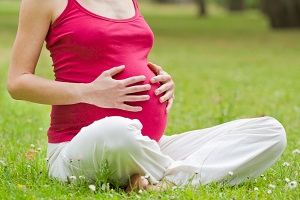In pregnancy there are many obvious changes in the woman's body, which adapts to accommodate the fetus. A study by Dr. Flavia Cardini reveals that together with physical expansion there is a mental one. During the third quarter, pregnant women experience an increase in their personal space.
The researchers asked a group of pregnant women to define their own personal space. The women were blindfolded and had to press a button as soon as they touched the abdomen. In some cases the answer was disturbed by a long sound, which seemed to start from afar and approach. Usually, people react more slowly to the touch when the sound seems far away. When it starts to approach, however, they are more reactive. Dr. Cardini and her team verified whether the responses of pregnant women reacted differently. From what emerged, during the pregnancy the answers vary.
Women at the 34th week of gestation responded more quickly to the touch, especially when compared to other non-pregnant women. This means that their perception of personal space is wider. According to some psychologists, it could be a protective reaction towards the baby bump to defend. Yet, the phenomenon occurs only very far in the gestation: the women at the 20th week have not in fact showed any change.
Dr. Cardini expected changes even in the early stages of gestation. Perhaps, in the first few weeks, the need to protect the baby's bump is less pronounced. However, this also explains why so many women experience a heightened discomfort when relatives and friends insist on touching the baby bump.
Source: sciencenews.org
















